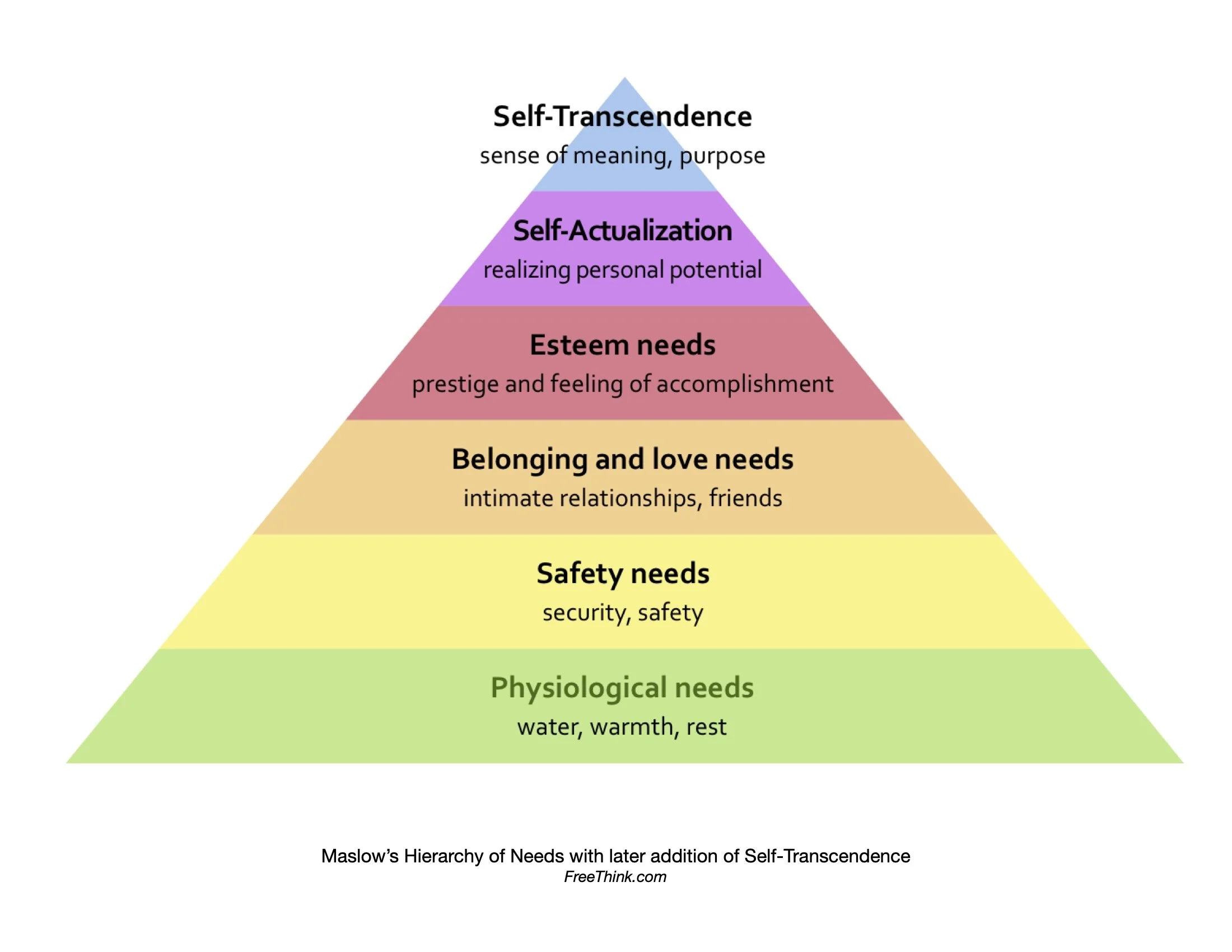Relationships live in this Dynamic Tension
Healthy egalitarian, interdependent relationships live in a dynamic tension between wanting our own way in pursuit of an authentic, self-actualized life, and yielding to others from other-centered love. Imbalance in either direction brings problems for oneself and for those with whom we are in relationship. The key is a balance of self-protection and protection of another. To say it another way, the ideal relationship is one of mutual giving, so that neither side feels they have to take from the other to achieve a self-actualized life.
Abraham Maslow even came around to a perspective similar to this idea when late in his life he authored papers in which he put "Self-Transcendence" at the pinnacle of his famous Hierarchy of Needs, in place of Self-Actualization. That is, rather than Self-Actualization being the ultimate human need—life’s highest pursuit—he saw the ultimate goal in life to be investment of one’s life in something that transcends self. To practice such other-centeredness is to love. Self-Actualization is a fine personal motivator for the employment of our innate potential. But it risks manifesting in an avoidant or detached, selfish lifestyle that risks isolation as relationship health is sacrificed on the altar of self-pursuit.
Per Maslow’s ascending needs, our natural tendency is to pursue what we need—at first for survival, then in pursuit of a meaningful life. Without balance, however, self-preservation, self-development, and self-advancement can lead to taking what we need at the expense of others with whom we are in relationship. This poses the risk of selfishness, setting ourselves up against others, defending ourself and our needs against them. This self-protection is the opposite of protecting the other, which leaves others to fend for themselves, being self-protective against us. In such a scenario, the two parties become caught in an endless cycle of self-defensiveness that tears apart the relationship.
At the other end of the spectrum is love—considerate toward and protective of the wants and needs of others with whom we are in relationship. This is the kind of love we see demonstrated in the love of a parent toward a child; it is selflessness that sacrifices sleep, the use of time and space, dietary choices, the layout of the home, and many other things for the sake of the child's needs and development. Such other-preferential love is vulnerable because there is no guarantee of reciprocation. Indeed, parents and children do not have an egalitarian, interdependent relationship; minor children are not be expected to sacrificially protect parents in reciprocal ways; that payoff may come with advanced age and inverted dependence. By contrast, in relationships on par, such as marriage, other-centered love is the path to healthy interdependence. Such love is vulnerable because, in protecting the other's needs, we do so without a net; there is no guarantee that the recipient of our other-centered protective yielding will also lovingly yield to and protect our needs and interests. If such reciprocation is not given, then there is enmeshment, leading to eventual resentment, or detachment, leading to eventual isolation.
The ideal in marriage is mutual love, mutual protection of one another, and mutual consideration. That is, the feelings, needs, wants and wishes of each partner are understood and protected by the other. Both are alleviated from having to act selfishly by taking what they need at the expense of the other. Instead, both give (notice the arrows in the diagram go only one way) what the other needs to have a life that is safe, secure, happy, self-actualized, and satisfying. Not that partners are the complete source of all these things for each other; that would suggest a god-complex, or the imposition of the same on the other. God is the ultimate source of our deepest needs and must be sought for their filling, lest we seek the fulfillment of all of our needs from our spouse. But such mutual, sacrificial giving toward one another’s needs is the essence of love; even of friendship. And according to The Gottman Institute, friendship is the essence of a mutually satisfying marriage.
The risk of other-centered love and a focus upon sacrificially giving to the other is codependence, one aspect of which is losing oneself. Co-dependents lose their voice and even their identity in the life and needs of the other—to an extreme. I say to an extreme because marital oneness does require adjustments. To live however we wish, making whatever decisions without consideration, consultation or yielding, saying whatever we want in whatever manner we want to say it, whenever we want to say it, doing as we please regardless of the effect on others—that is called living alone… detached isolation. By contrast, in marriage, we adjust for the sake of the other and are thus changed for the better by other-centeredness. We don’t lose ourselves, becoming only a shadow or an appendage of our spouse—codependence—for, as stated above, that eventually leads to enmeshment and resentment.
When mutual adjustments are made to one another in mutual consideration, there is a balanced interdependent relationship. When this does not occur, such as in cases where a partner is inconsiderate, disrespectful, selfish or bullying, boundaries must be erected. An extreme example of this would be domestic violence, where other-protective love is wholly absent. In this case, the abused spouse must erect boundaries of self-protection against violence and disrespect, making clear in words and actions what will not be tolerated—even to the point of leaving. Boundaries do not impose a change on someone else, boundaries educate others on what is essential to us. For example, it is not a boundary to impose on someone else the edict, “You have to clean up your language.” Instead, a boundary might state, “I won’t stand here and be yelled and cussed at. I’d be glad to talk through this respectfully, with respectful language.” Boundaries are often best stated as positive requests that cast a vision for what is wanted, appreciated, needed, or expected, such as, “I’d be glad to talk through this in a mutually respectful way.” The stating of boundaries is even more palatable when accompanied by an affirmation, such as “I appreciate the way you’re limiting your drinking when we’re out together, and your support last Saturday of me being the designated driver. It makes me feel so protected. Thank you.” A positive request with an affirmation keeps the boundary from sounding like a criticism; it even turns it into a compliment.
Finally, Abraham Maslow’s recognition that self-transcendence is a higher human need than self-actualization in the achievement of a satisfying life brings the illustration full-circle; self-transcendence requires other-centeredness (love). It is to sacrifice in favor of something higher; something that transcends our self; something or someone that we regard as so important that we would yield what is important to us in deference to what is important to them. Examples of this include parenting, patriotism, and helping the poor who cannot repay us. Organ donors, teachers, soldiers and missionaries give of themselves in ways that typically do not result in fame nor fortune, but pay dividends in a meaningful life, precisely because these pursuits transcend self interest. Such altruism—even to the point of sacrificing one’s life—paradoxically fulfills one’s life.
Marriage is a unique environment in which the ideal is that this other-centered self-transcendence is mutually practiced through sacrificial love, resulting in two lives that are self actualized, with interdependent support from one another.



